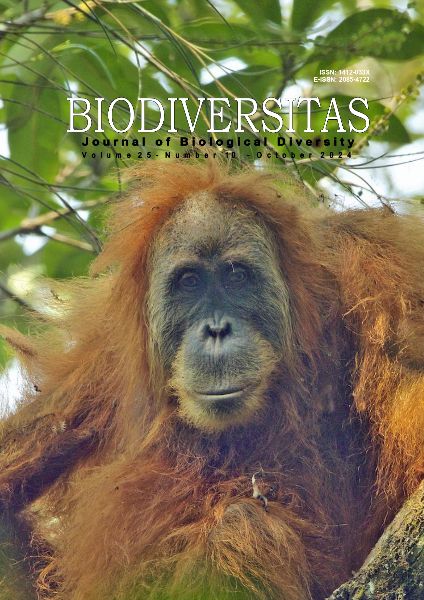Isolation and identification of salt-tolerant, phosphorus-solubilizing bacterial strains from rice soil in rice-shrimp farming systems in Tien Giang Province, Vietnam
##plugins.themes.bootstrap3.article.main##
Abstract
Abstract. Tat TQ. 2024. Isolation and identification of salt-tolerant, phosphorus-solubilizing bacterial strains from rice soil in rice-shrimp farming systems in Tien Giang Province, Vietnam. Biodiversitas 25: 3868-3875. This study aimed to isolate, select, and identify the phosphate-soluble bacterial (PSB) pathogens from eight salt-affected soil samples collected from paddy rice fields in the Go Cong Dong and Tan Phu Dong districts of Tien Giang Province, Vietnam. Bacteria were isolated on Pikovskaya’s agar media supplemented with 1% NaCl, and the amount of phosphorus dissolved in liquid NBRIP was supplemented with various concentrations of NaCl via molybdate coloration to evaluate the salt tolerance and phosphorus solubility of the isolated bacterial strains. The result showed that from 8 saline soil samples, a total of 15 strains of phosphorus solubilizing bacteria were isolated and 2 (code 1.7 and 6.1) of them showed good phosphorus solubilization. In addition, isolates 1.7 and 6.1 exhibited good growth and phosphorus solubilization in liquid NBRIP media supplemented with NaCl at concentrations ranging from 1.0% to 5.0%. Molecular analysis results showed that strains 1.7 and 6.1 were identified as Burkholderia vietnamiensis 1.7 and Priestia aryabhattai 6.1, respectively. These results show that B. vietnamiensis 1.7 and P. aryabhattai 6.1 can be used as biofertilizers for rice cultivation in salty soils in Tien Giang Province, reducing the cost and use of chemical fertilizers.

